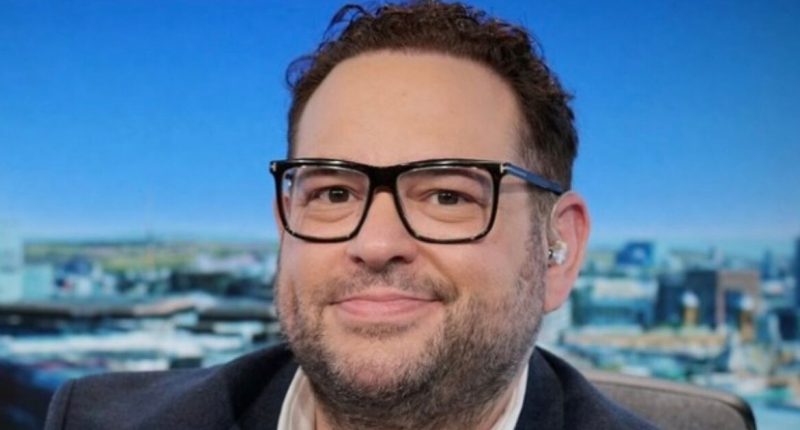Share this @internewscast.com
As a broadcaster with 20 years of experience, I’m used to talking. I truly believe discussing issues in the news, thrashing things out, is the key not only to solving problems, but to good mental health. And experts agree. A recent study found “talking therapies” – like seeing counsellors or psychiatrists – achieve far better results than any other type of treatment. But even talking with friends can help. Who doesn’t feel better after a chin-wag?
The Mental Health Foundation agrees, stating friendships play a “key role” in good mental health. I’ve presented many different types of radio shows, but there’s nothing that compares with the emotional connection I’ve felt when hosting late-night phone-ins. This sort of show is a place where I’ve heard the most incredible stories from people about their lives. I’ve been privy to triumphs, tragedies, laughter and tears. It’s been an honour and a privilege to lend an ear.
What many of them don’t know is how much they’ve helped me with my mental health over the years. During times when I’ve been suffering with debilitating depression or a crippling eating disorder, it’s knowing I’d get a chance to speak to callers which gave me the will to dust myself off, get dressed and go to work. And every time, I’ve felt better after – demonstrating the power of talking. Thankfully, I’m in a far happier place now. But I still wasn’t prepared for a call I received four years ago during the Covid lockdown. It was a surreal and frightening time for everyone.
But as the presenter of the 10pm-1am show on TalkTV, I genuinely felt I had a duty to help with the mental health of my audience – many of whom hadn’t really seen anyone in person for months. I used to call myself their “late-night friend” as people were so delicate during that period. It was a heavy responsibility and I like to think the experience of my own mental-health struggles brought a perspective which really helped.
One night, my producer put through a call from “Simon”. While I was used to hearing those who were struggling, Simon was different. Within moments of coming on air, he delivered a bombshell: he was planning on taking his own life. He’d already tried once, and failed. His mental health was still in turmoil, he was racked with guilt about letting down his children over his previous suicide attempt, and was in despair over the personal problems he was facing around his finances, his ex-partner, and his job. He saw no other way out.
I did what any friend would do – I listened. I let him talk. I gave him advice. I repeatedly told him he had nothing to feel guilty about. That things would change and the power was in his hands. We just happened to be speaking on a national radio station with an audience of hundreds of thousands of people, but it could have been any two friends talking. The conversation lasted more than 20 minutes which is unheard of on Talk radio. And then off-air, my producer gave Simon advice on where he could get help.
It was a tough call, but we really hoped we’d got through to him, and we were happy he’d chosen to speak to someone. He’d unburdened himself of the weight he was carrying, even if it was on national radio, and seemed better for it. Subsequently we’d tried contacting Simon again in the following months without any luck, and I’d often thought about whether his mental health had improved since our call. So I was shocked to the core when I finally heard from him four years later.
Unfortunately due to cuts, my show was one of many being axed by the station. During my final show, “Simon from Bristol” was put through and,by then, it had been so long I’m embarrassed to admit I didn’t recognise his name. But I was left speechless when he told me he couldn’t let me leave Talk without thanking me for “saving his life”.
He went on to explain that the call he made was the turning point. He’d gone on to have a meaningful relationship with his children, a stable home life, and even a dog. And he credited it, the help we gave him, as the moment it all changed. It kick-started his journey to a better place.
Hearing that was one of the most humbling moments in my career. As I pointed out, all I did was be a friend; he’d actually done the hard work by speaking out about his mental health.
What would have happened had he not called my show four years ago? If, like the two-thirds of people who suffer, he’d decided to just put on a brave face? He’d almost certainly not have been here to tell the tale, yet another statistic of male suicide which is still rising every year. If anything shows how crucial it is to speak up about mental health, this does.
I’m thrilled the Radio Academy has recognised the moment Simon called to thank me as a nominee in this year’s ARIA awards for Radio Times Moment of the Year. It’s voted for by the public, votes close May 1, and if we won, it really would cement the power of radio as well as the importance of speaking up about your mental health.
How To Help:
Middle-aged men are more likely to take their own lives than any other age group. Male suicides have accounted for three-quarters of all cases since the mid-90s. So the advice from organisations like the Samaritans, if someone mentions suicidal thoughts, is not to dismiss them. Try and encourage them to open up and talk.
And don’t worry if you struggle; these conversations are difficult. But it’s important to let them know they are not alone. Remember, you may not always have a solution and it won’t help if you tell them about someone worse off. They need you to be supportive, not reactive. And rather than criticising or apportioning blame, ask about their reasons then listen to the answers. Reassure them they won’t feel this way forever and that the intensity of feelings can reduce in time. Encourage them to focus on getting through the day rather than dwelling on the future.
If they have a plan for ending their life, encourage them to get professional help. Try to keep them safe by not leaving them on their own, keep talking and remove any harmful items.
- If you are worried they are in danger, call 999 immediately. Alternatively, contact the Samaritans on 116 123.














